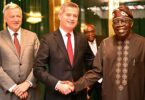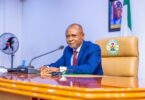The government of Germany alongside the United Nation Development Programme (UNDP) have secured an agreement for a €8.5 million (approximately $9.4 million) police reform project in Nigeria.
This in contained in a statement by the Germany’s Ambassador to Nigeria, Annett Günther, on Thursday via her official X (formerly Twitter) account.
Mrs. Günther highlighted that the €8.5 million allocation is a segment of the €21 million in funds that Germany has pledged towards project-related initiatives in Nigeria.
She emphasized that this agreement represents the subsequent phase of the ongoing police reform efforts in the country, which Germany has been backing since 2021.
“Today I signed an agreement with UNDP to implement the next phase of the Nigeria Police Reform Project. Germany has supported the reform process since 2021.
“This new phase, worth €8.5million brings the total committed funds from Germany to €21million,” Günther said.
The United Nations Office on Drugs and Crime, in collaboration with the Office of the High Commissioner for Human Rights, has two distinct yet interconnected projects focused on police oversight and accountability in Nigeria.
These projects were developed in response to a request from the Inspector General of Police for assistance in enhancing the internal oversight mechanisms managed by the Complaints Response Unit (CRU). The CRU is a public-facing complaints management system designed to address all instances of police professional misconduct that arise during interactions between police officers and citizens.
Acknowledging that police oversight should not remain solely an internal affair, the projects emphasize the importance of external oversight bodies. Key players in this regard include the Police Service Commission, the National Human Rights Commission, and various civil society organizations, all of which are vital in ensuring greater transparency and accountability in police conduct.
The primary partners involved in these projects are the Nigeria Police Force, the National Human Rights Commission, the Police Service Commission, the Ministry of Police Affairs, and several Civil Society Organizations. These entities collectively contribute to the effective implementation and success of the oversight initiatives.
The Nigeria Police Force (NPF), like many security agencies in the country, struggles with chronic underfunding and insufficient budgetary allocations.
Recently, TheWitness reported that the federal government temporarily relocated several families residing in the Falomo Barracks in Lagos to facilitate the reconstruction of the deteriorating structures. To support these families, the government provided financial aid of N2 million per household.
However, this amount barely scratches the surface of the broader economic challenges confronting the police force.
Consequently, there have been calls for the decentralization of the police, allowing sub-national governments to share in the responsibility of maintaining the force and ensuring the welfare of its personnel.







